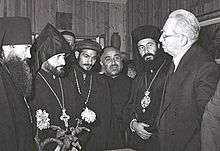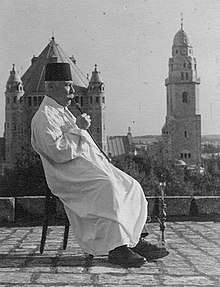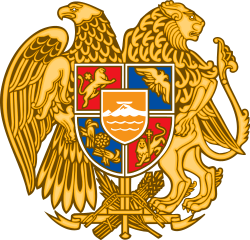Armenia–Israel relations
 | |
Armenia |
Israel |
|---|---|
Armenia–Israel relations are the bilateral relationship between Armenia and Israel. From 1993 to 2007, Armenia was served by the Embassy of Israel in Georgia. In 1996, Tsolak Momjian was appointed the honorary consul of Armenia in Jerusalem. Eleven years later, the residence of the Embassy of Israel in Armenia was moved to Jerusalem. In October 2010, Shmuel Meirom was appointed the Israeli ambassador to Armenia.[1] Armen Melkonian was appointed the Armenian ambassador to Israel in 2012, with a residence in Cairo.[2] In October of that year, Melkonian presented his credentials to Israeli President Shimon Peres.[3]
Armenians in Israel
The Armenian community have lived in the Levant for about 2,000 years. According to Yoav Loeff (lector of Armenian language and history at Hebrew University of Jerusalem), the Armenian presence in Jerusalem dates to 301 AD thanks to the Armenian Patriarchate of Jerusalem (which dates to the Apostolic Age).[4][5] Tigranes the Great, under whom Armenia reached its greatest extent, deported thousands of Jews to Armenia in the first century BC.[4] Israel is home to the Armenian Quarter of the Old City of Jerusalem.[6][7] The Armenian Patriarchate of Jerusalem was founded in 638 and is located in the Armenian Quarter, the smallest of the four quarters of the Old City of Jerusalem. According to a 2006 study, 790 Armenians live in the Old City.[8] One of the earliest mentions of Armenians and Jews is in the 1723 book Travels through Europe, Asia, and into parts of Africa by French traveler Aubry de La Motraye, in which de La Motraye writes that the Armenians and Jews are "reckon'd more honest" than the Greeks in the Ottoman Empire.[9]
About 25,000 Armenians lived in Mandatory Palestine by the 1948 Arab–Israeli War, but most fled the area in the ensuing violence.[5] After the establishment of the state of Israel, most of the remaining Armenian community adopted Israeli citizenship and settled in the Old City's Armenian Quarter.[5]
Israel supported Azerbaijan with weapons and ammunition during the Nagorno-Karabakh War against Armenia in the early 1990s for geopolitical reasons; the perceived threat of the Islamic Republic of Iran was considered.[10][11][12] According to the Journal of Turkish Weekly, relations between Israel and Armenia deteriorated because of the conflict; blame was also partly placed on the Jews of Azerbaijan, who circulated conspiracy theories in Armenian society.[13]
Several spitting incidents have occurred in the Old City, usually by Haredi Jews who study at yeshiva. The Jerusalem Post reported in 2009 that of all Christians living there, Armenians were most often spat at by the ultra-Orthodox Jews.[14] In 2011, several incidents of spitting and verbal attacks on Armenian clergymen by Haredi Jews were reported in the Old City. The Jerusalem district police responded, "All complaints of mutual assault are treated with the utmost severity. In the past, more than one case ended with charges being filed and the deportation of clergy involved in assault. As opposed to the situation about three years ago, the frequency of spitting has declined dramatically." [15] Armenian Patriarchate of Jerusalem (an independent, self-governing Christian patriarchate dating to the Apostolic Age) Nourhan Manougian said in 2013, "If Israel recognizes the Armenian Genocide it won't be the end of the world" and Armenians in Jerusalem are being treated as "third-class citizens" (referring to Israeli bureaucracy).[16]
Culture
Armenian-Israelis are ethnic Armenians with Israeli citizenship. Three thousand[17] Armenians live in Israel, including 1,000 in Jerusalem's Armenian Quarter.[18] About one thousand Armenian-Israelis have Israeli citizenship, mainly in Jerusalem, Tel Aviv Jaffa and Haifa. The Institute of African and Asian Studies at Hebrew University established an Armenian-studies programme specialising in study of the Armenian language, literature, history and culture and the Armenian Genocide. The Jewish Virtual Library described Jerusalem's Armenian Quarter:
Unlike other Quarters in the Old City, the Armenian Quarter is well preserved. The St. James Convent is a complex of several churches with open spaces and gardens covered with a variety of greenery. The Patriarchate building next door is an impressive structure consisting of the Patriarch's residence, gold embossed throne room and several offices. Behind its main gate, the convent contains priest's quarters, a library building, a museum, printing press, elementary and high schools and residences, youth and social clubs and residential shelters for the poor and employees of the Patriarchate. Currently the Theological Seminary is located outside the convent across the street from the main gate.[18]
Some of Jerusalem's artistic heritage has been influenced by Armenian ceramics and tile-painting.[5]
Jewish community in Armenia
Before the 1996 discovery of a medieval Jewish cemetery, it was believed that there was no Jewish presence in Armenia before modern times.[19] A team of Armenian and Israeli historians and archaeologists excavated the site of the original discovery, and found 64 more graves.[19] It was determined that the Jewish community in Armenia dated back at least to the 13th century.[19] Bishop Mkrtchyan, who first discovered the cemetery, said: "At a time when you can't imagine that a country ... in Europe either helped create or didn't destroy a Jewish settlement ... It is fantastic how they could gather cultural, architectural symbolism of Jewish Armenians ... and they were connected, and built one of the strongest kingdoms during [the] time of [the] Mongols."[19]
Historians have conjectured that the first Jews arrived in Armenia shortly after the destruction of the first Temple in Jerusalem.[20] They lived (and live) relatively peacefully with the Armenian Christians, with anti-Semitic incidents being a rarity.[20] Many immigrated to Israel after the establishment of the state of Israel in 1948,[20] and 2002 estimates number the ethnic Jews in Armenia at under 1,000.[21]
A Russified Jewish community of 800 officially remains in Armenia, primarily in Yerevan, in addition to the Subbotniks who live near Sevan.[4][22] Rimma Varzhapetian-Feller, head of Armenia's Jewish community, has said that she always felt proud of Armenia when she met fellow Jews from other parts of the former Soviet Union: "We always declare everywhere that there has never been antisemitism in Armenia, that Armenia is a good place for Jews to live and, more importantly, that Armenia is quite a stable country in political and social respects". The first instances of antisemitism in Armenia occurred in September 2004 when, for the first time in Armenia's history, the Joint Tragedies Memorial in Yerevan was desecrated.[23]
On 23 October 2004, Armenian Department for Ethnic and Religious Minority Issues head Hranoush Kharatyan accused Israeli leaders of promoting intolerance toward non-Jews[24] in response to an incident where a yeshiva student spat on Archbishop of Jerusalem Nourhan Manougian during a religious procession in the city.[25] The student eventually apologized to the archbishop.[26] During her 2012 visit to Armenia, Israeli Minister of Agriculture Orit Noked said: "We are like each other with our history, character, with our small number of population and having communities abroad."[27]
Economic relations
Since independence, Armenia has received support from Israel and is one of its trade partners. According to the CIA World Factbook, Armenia receives 4.8 percent of its imports from Israel and Israel receives 7.1 percent of Armenia's exports.[28]
Diplomatic relations
Israel and Armenia have maintained diplomatic relations since the latter's independence from the Soviet Union in 1991.[1] The Armenian diplomatic mission to Israel was located in Georgia from 1993 to 2007, although Tsolak Momjian was appointed honorary consul of Armenia in Jerusalem in 1996.[1] The embassy was eventually moved to Jerusalem.[1]
There have been several high-level visits to Israel by Armenians. Former Armenian president Robert Kocharyan traveled to Israel and met with high-ranking Israeli officials, including former Israeli Prime Minister Ehud Barak, in January 2000. Both countries pledged to strengthen relations and signed agreements on health and bilateral investment.[29] In 2003, Catholicos of All Armenians Karekin II visited Ashkenazi Chief Rabbi of Israel Yona Metzger. Metzger accepted Karekin's invitation to visit Armenia[30] in 2005, and his trip included a visit to the Tsitsernakaberd (the Genocide Memorial in Yerevan).[31] At the memorial, he formally recognised the Armenian Genocide.[32] In 2014 Shmuel Meirom (Israel's ambassador to Armenia, with a residence in Jerusalem) said that Israel is willing to abolish all visas with Armenia soon, beginning with holders of diplomatic passports.[33]
| Date | Location | Note |
|---|---|---|
| December 1994 | Israel | Armenian Minister of Foreign Affairs Vahan Papazian visits.[1] |
| February 1995 | Israel | President Robert Kocharyan of the Republic of Armenia visits.[1] |
| October 1998 | Israel | Armenian Minister of Foreign Affairs Vardan Oskanian visits.[1] |
| January 2000 | Jerusalem | Armenian President Robert Kocharyan meets with Israeli Prime Minister Ehud Barak, President Ezer Weizman, Speaker of the Knesset Avraham Burg, Minister of Interior Natan Sharansky, and Mayor of Jerusalem Ehud Olmert.[1][34] |
| November 2005 | Yerevan | Israel's chief rabbi, Yona Metzger, visits Armenia and declares that the Israeli Jewish community recognizes the Armenian Genocide.[35] |
| August 2011 | Yerevan | Israeli diplomats (headed by Foreign Ministry official Pinchas Avivi) and Armenian diplomats (headed by Deputy Foreign Minister Arman Kirakosian) meet to discuss the relationship between their countries.[36] |
| April 2012 | Yerevan | Israeli Agriculture Minister Orit Noked meets with Armenian Prime Minister Tigran Sargsyan and Agriculture Minister Sergo Karapetian.[37] |
| July 2013 | Yerevan | Armenian President Serzh Sargsyan meets with Yair Auron, an Israeli historian who specializes in genocide studies.[38] |
Armenian Genocide denial

Israel does not officially recognize the Armenian Genocide.[39] Recognition of the genocide became a subject of debate in Israel in the years following Armenia's 1991 independence from the Soviet Union. Turkey has warned that labeling the events as genocide by Israel or the United States would harm its relations with Israel.[40] In October 2008, the Knesset voted to have a parliamentary committee convene on the Armenian Genocide at the urging of Meretz chairman Haim Oron, leading to meetings of the Foreign Affairs and Defense Committees. The government of Turkey continued to lobby to prevent the recognition from going further.[41] According to The Jerusalem Post, "many Israelis are eager for their country to recognize the Genocide".[42] During the summer of 2011, the Knesset held its first discussion on the matter. By a unanimous 20-0 vote, the Israeli parliament approved a public session on the issue by the Education, Culture and Sports Committee at the request of Meretz Knesset member Zahava Gal-On;[43] it stopped short of passing a bill put forward by Gilad Erdan, an Israeli cabinet minister and close ally of Prime Minister Benjamin Netanyahu, for political reasons.[44] Knesset Speaker Reuven Rivlin, one of the bill's supporters, said: "It is my duty as a Jew and Israeli to recognize the tragedies of other peoples."[45] Rivlin told an Israel-based Armenian action committee that he intends to introduce an annual parliamentary session to mark the Armenian Genocide.[46]
The Armenian community of Jerusalem believes that the genocide denial is due to fear of jeopardizing diplomatic relations with Turkey.[5] Yair Auron, an Israeli historian, scholar and expert specializing on Holocaust and Genocide studies, said that Israel is concerned about hurting its current trade relations with Turkey and wants to retain the uniqueness of the Holocaust.[47]
The Israel lobby in the United States, the Anti-Defamation League[48] and the American Jewish Committee[49][50][51] recognize the Armenian Genocide. Yad Vashem, Israel's Holocaust memorial, has identified 24 Armenians as Righteous Among the Nations for risking their lives to rescue Jews during the Holocaust.
20th century
A major primary source for the Armenian Genocide, Ambassador Morgenthau's Story (1918), was written by Henry Morgenthau, Sr. (a Jewish-American lawyer who was Ambassador of the United States to the Ottoman Empire from 1913 to 1916. Raphael Lemkin, a Polish lawyer of Jewish descent, coined the word "genocide" (describing a crime against humanity) in 1943 as a response to the Armenian tragedy.[52][53][54] Arguably the most famous novel about the genocide, The Forty Days of Musa Dagh (1933), was written by Franz Werfel (an Austrian of Jewish descent).[55]
Controversy
Israeli Foreign Minister Shimon Peres called the Armenian Genocide "meaningless" in 2001.[56] Israel Charny, executive director of the Institute on the Holocaust and Genocide in Jerusalem, responded that Peres was going "beyond a moral boundary that no Jew should allow himself to trespass".[56] In his letter to Peres, Charny wrote:
It seems that because of your wishes to advance very important relations with Turkey, you have been prepared to circumvent the subject of the Armenian genocide in 1915–1920 ... it may be that in your broad perspective of the needs of the state of Israel, it is your obligation to circumvent and desist from bringing up the subject with Turkey, but, as a Jew and an Israeli, I am ashamed of the extent to which you have now entered into the range of actual denial of the Armenian genocide, comparable to denials of the Holocaust.[56]
In 2008, Yosef Shagal, an Azerbaijani-born former Israeli parliamentarian from the far-right Yisrael Beiteinu party (founded by immigrants from the former Soviet Union, including Jews from Azerbaijan) said in an interview with an Azerbaijani news outlet: "I find it is deeply offensive, and even blasphemous to compare the Holocaust of European Jewry during the Second World War with the mass extermination of the Armenian people during the First World War. Jews were killed because they were Jews ... [With Armenians] the picture is principally different - seeking to establish the state and national independence, Turkish Armenians sided with Russian Empire, which was at war with Turkey".[57]
References
- 1 2 3 4 5 6 7 8 "Bilateral Relations". Ministry of Foreign Affairs of the Republic of Armenia. Retrieved August 9, 2013.
- ↑ Chernamorian, Artiom (May 11, 2012). "Armenia Already Has An Ambassador In Israel". Friends of Armenia. Retrieved August 9, 2013.
- ↑ Cashman, Greer (October 17, 2012). "New Egyptian envoy: We're committed to peace". The Jerusalem Post. Retrieved August 9, 2013.
- 1 2 3 "Armenia". National Coalition Supporting Soviet Jewry. Archived from the original on July 6, 2011. Retrieved 16 August 2013.
- 1 2 3 4 5 Gelfond Feldinger, Lauren (June 29, 2013). "'We are third-class citizens,' says Armenian Patriarch of Jerusalem". Haaretz. Retrieved August 8, 2013.
- ↑ "Jerusalem - The Old City: The Armenian Quarter". Jewish Virtual Library.
- ↑ Neusner, Jacob (1965). A History of the Jews in Babylonia, Volumes 1-5. Brill Archive. p. 27.
Tigranes took a large number of Jews captive, and deported them to Armavir and Vardges on the Ksakh river, which became a great commercial center.
- ↑ "Jerusalem The Old City The Urban Fabric and Geopolitical Implications" (PDF). International Peace and Cooperation Center. 2009. p. 43. ISBN 965-7283-16-7. Retrieved 30 August 2013.
- ↑ Aubry de La Motraye (1723). A. de La Motraye's Travels through Europe, Asia, and into parts of Africa. London: Printed for the author. p. 189.
- ↑ R. Hrair Dekmejian & Hovann H. Simonian. Troubled Waters: The Geopolitics of the Caspian Region, 2003, p. 125 "In addition to commercial links, Israel has given strong backing to Azerbaijan in its conflict with Armenia over Nagorno-Karabakh, which reportedly has included military assistance."
- ↑ Sedat Laçiner, Mehmet Özcan, İhsan Bal. USAK Yearbook of International Politics and Law 2010, Vol. 3, p. 322 "Israel was one of the strategic partners and supporters of Azerbaijan in the Nagorno-Karabakh War with Armenia."
- ↑ Bahruz Balayev, The Right to Self-Determination in the South Caucasus: Nagorno Karabakh in Context, Lexington Books, 2013, p. 73 "Israel has supported Azerbaijan in its conflict with Armenia for the enclave of Nagorno Karabakh."
- ↑ Laciner, Sedat (2002). "Armenia's Jewish Scepticism and Its Impact on Armenia-Israel Relations". Journal of Turkish Weekly. Retrieved 30 August 2013.
- ↑ Derfner, Larry (26 November 2009). "Mouths filled with hatred". The Jerusalem Post.
Of all Old City Christians, the Armenians get spat on most frequently because their quarter stands closest to those hot spots.
- ↑ Rosenberg, Oz (6 November 2011). "Armenian clergy subjected to Haredi spitting attacks". Haaretz. Retrieved 3 March 2014.
- ↑ "'We are third-class citizens,' says Armenian Patriarch of Jerusalem". Haaretz. 29 June 2012. Retrieved 31 August 2013.
- ↑ "Armenia Diaspora (Հայաստան սփյուռք)" (in Armenian). Archived from the original on 2013-05-11.
- 1 2 "The Armenian Quarter". Jewish Virtual Library. Retrieved August 9, 2013.
- 1 2 3 4 Borshchevskaya, Anna (February 11, 2013). "Jewish Armenia". The Jerusalem Post. Retrieved August 8, 2013.
- 1 2 3 "Armenia: History of Jewish Community". Jewish Virtual Library. Retrieved August 8, 2013.
- ↑ "Armenia's Jewish Scepticism and Its Impact on Armenia-Israel Relations". Turkish Weekly. Retrieved August 9, 2013.
- ↑ "The Subbotniks: an Armenian community on the fringe of extinction - World". Jewish Journal.
- ↑ Danielyan, Emil (26 January 2005). "Armenia: Country's Jews Alarmed Over Nascent Anti-Semitism". Radio Free Europe/Radio Liberty. Retrieved 30 August 2013.
- ↑ "Armenia: Country's Jews Alarmed Over Nascent Anti-Semitism". RadioFreeEurope/RadioLiberty.
- ↑ Armenian archbishop quizzed over spat with yeshiva student. Haaretz, Oct 11, 2004
- ↑ Jerusalem yeshiva student apologizes to Armenian archbishop for spitting Haaretz, Oct. 18, 2004
- ↑ "Israeli Minister of Agriculture Speaks About Similarities Between Histories of Armenians and Jews". Armenian Mirror-Spectator. 20 April 2012. Retrieved 30 August 2013.
- ↑ "The World Factbook". cia.gov.
- ↑ Advocates on Behalf of Jews in Russia, Ukraine, the Baltic States and Eurasia - Armenia Archived July 6, 2011, at the Wayback Machine.
- ↑ Ara Abrahamian called to develop Armenia-Israel relations
- ↑ "The Armenian Church". armenianchurch.org.
- ↑ "World Jewish Congress: Israeli Chief Rabbi says killing of Armenians in 1915 was genocide".
- ↑ "Arminfo: Shmuel Meirom: Israel is willing to contribute of its experience in the field of economy, but it cannot force Israeli business to invest in Armenia". arminfo.am.
- ↑ "President of Armenia - Visit to Israel". Israel Ministry of Foreign Affairs. January 20, 2000. Retrieved August 9, 2013.
- ↑ "Israeli chief rabbi in historic Armenia visit". European Jewish Press. November 24, 2005. Archived from the original on February 24, 2012. Retrieved August 9, 2013.
- ↑ Danielyan, Emil (August 23, 2011). "Armenia, Israel Review Tenuous Relationship". Azatutyun. Retrieved August 9, 2013.
- ↑ "Israeli Minister Visits Armenia". Asbarez. April 16, 2012. Retrieved August 9, 2013.
- ↑ "President Sargsyan receives visiting Israeli historian". Armenia Now. July 18, 2013. Retrieved August 9, 2013.
- ↑ Tharoor, Ishaan (April 24, 2015). "Why Israel does not recognize the Armenian 'genocide'". washingtonpost.com. Retrieved November 18, 2017.
- ↑ "Israel expresses concern over Turkish-Armenian massacre dispute". The Associated Press. 2007-10-11. Retrieved 2008-02-02.
- ↑ "A Turkey-Armenia reconciliation?". Los Angeles Times. 2008-04-25. Archived from the original on 30 April 2008. Retrieved 2008-04-25.
- ↑ David Smith (2008-04-25). "Armenia's 'Christian holocaust'". The Jerusalem Post. Retrieved 2008-04-25.
- ↑ Stoil, Rebecca Anna (18 May 2011). "Knesset moves toward recognizing Armenian genocide". Jerusalem Post. Retrieved 19 May 2011.
For years, consecutive governments had blocked attempts by MKs to raise the subject of recognizing the genocide out of concern that such recognition could damage relations with Ankara. This year, however, the government did not block the hearing.
- ↑ "Israeli minister calls to recognize Armenian genocide". Reuters. 12 June 2012. Retrieved 30 August 2013.
- ↑ Lis, Jonathan (31 May 2011). "Knesset Speaker working to boost recognition of Armenian genocide". Haaretz. Retrieved 30 August 2013.
- ↑ Lis, Jonathan (31 May 2011). "Knesset Speaker working to boost recognition of Armenian genocide". Haaretz. Retrieved 2 June 2011.
Knesset Speaker Reuven Rivlin said Monday that he wanted to convene an annual parliamentary session of the full Knesset to mark the Armenian genocide of 1915 and 1916 at the hands of the Turks. 'It is my duty as a Jew and Israeli to recognize the tragedies of other peoples,' Rivlin said, speaking to an Israel-based Armenian action committee.
- ↑ Der Mugrdechian, Barlow (December 2000). "Dr. Yair Auron Analyzes Jewish Response to the Armenian Genocide Through New Research". Hye Sharzhoom. California State University, Fresno Center for Armenian Studies. Archived from the original on 18 July 2013. Retrieved 30 August 2013.
- ↑ ADL Statement on the Armenian Genocide www.adl.org, Press Release
- ↑ A Commemoration of the Centennial of the Armenian Genocide www.ajclosangeles.org, Event
- ↑ AJC Pays Tribute to Memories of Victims of the Meds Yeghern www.ajc.org, Press Release
- ↑ Turkey’s DC Envoy Angered by Jewish Group’s Genocide Recognition, Asbarez News
- ↑ Yair Auron. The Banality of Denial: Israel and the Armenian Genocide. — Transaction Publishers, 2004. — p. 9:"... when Raphael Lemkin coined the word genocide in 1944 he cited the 1915 annihilation of Armenians as a seminal example of genocide"
- ↑ William Schabas. Genocide in international law: the crimes of crimes. — Cambridge University Press, 2000. — p. 25:"Lemkin’s interest in the subject dates to his days as a student at Lvov University, when he intently followed attempts to prosecute the perpetration of the massacres of the Armenians"
- ↑ A. Dirk Moses. Genocide and settler society: frontier violence and stolen indigenous children in Australian history. — Berghahn Books, 2004. — p. 21:"Indignant that the perpetrators of the Armenian genocide had largely escaped prosecution, Lemkin, who was a young state prosecutor in Poland, began lobbying in the early 1930s for international law to criminalize the destruction of such groups."
- ↑ Bushinsky, Jay (20 August 2004). "The Armenian genocide : Face history's heartbreaking truth". The New York Times. Retrieved 3 September 2013.
- 1 2 3 Fisk, Robert (18 April 2001). "Peres stands accused over denial of 'meaningless' Armenian Holocaust". The Independent. Archived from the original on April 16, 2009. Retrieved 30 August 2013.
- ↑ Депутат парламента Израиля: "Считаю глубоко оскорбительными и даже богохульственными попытки сравнивать Катастрофу европейского еврейства в годы Второй мировой войны с массовым истреблением армянского народа в годы Первой мировой войны". Day.Az (in Russian). 28 March 2008. Retrieved 30 August 2013.

_BW.jpg)


